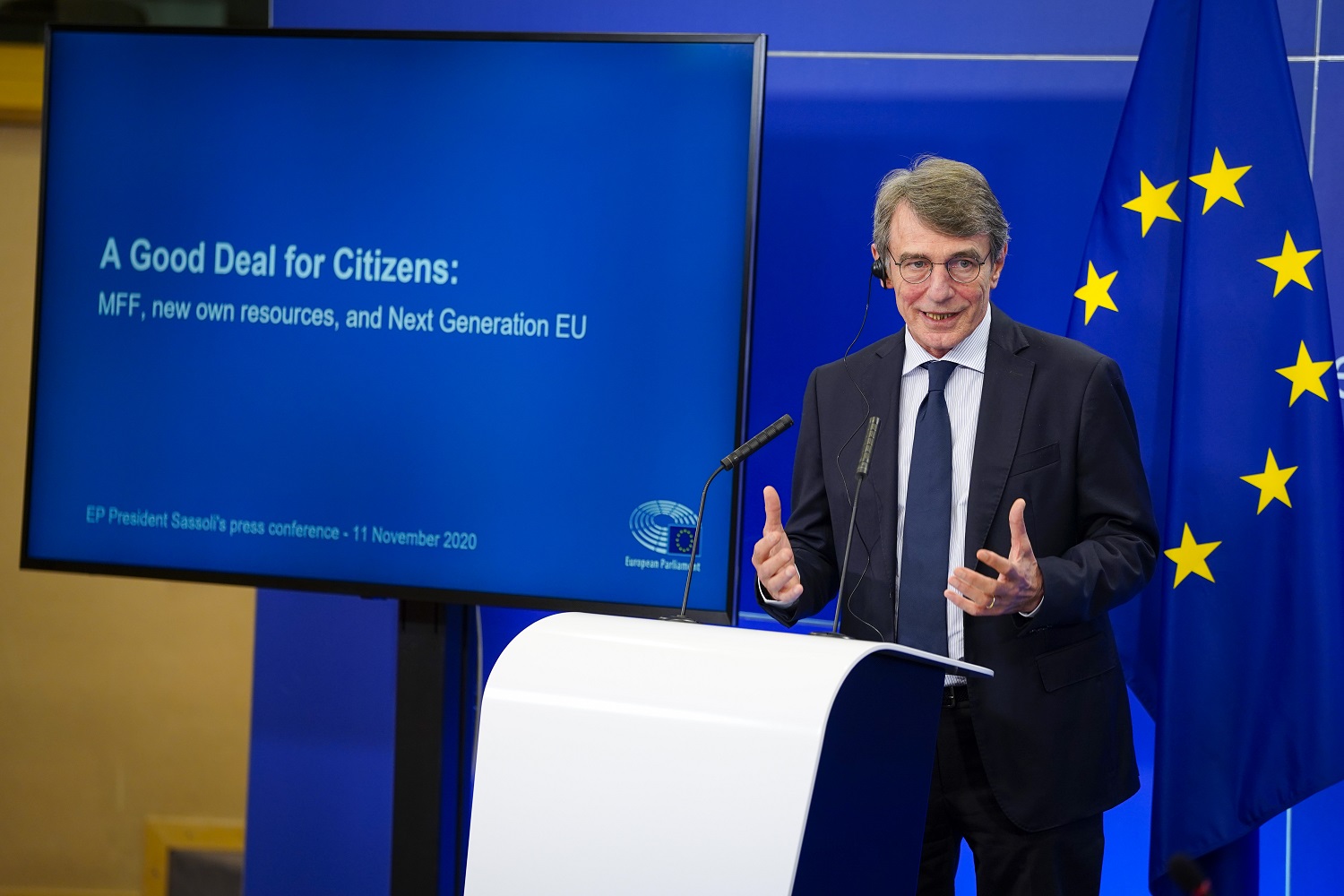Written by Katarzyna Sochacka and Clare Ferguson,

During the first November 2020 plenary session, the main debate followed Council and Commission statements on the multiannual financial framework (including own resources), on a rule of law conditionality mechanism and the recovery fund for Europe, subsequent to the agreements recently reached by Parliament’s negotiators in trilogue negotiations. Members also discussed the outcome of the United States presidential elections, and condemned recent terror attacks following Council and Commission statements on fighting terrorism and the right to freedom of expression and education. Members also held debates on access to Covid‑19 vaccination and the impact of Covid‑19 emergency measures on democracy, fundamental rights and the rule of law.
EU general budget for 2021
Members discussed next year’s spending plans in anticipation of the formal adoption of the final agreement on the 2021‑2027 multiannual financial framework (MFF). Members debated and adopted, by large majority, amendments to the Commission’s proposed EU general budget for 2021, focusing on the effects of the coronavirus pandemic. Among other priorities for Europe’s recovery, Parliament voted to increase funding (by €15 billion compared to the Commission proposal) for 15 flagship programmes to support young people, the health sector and the European Green Deal. The 21-day conciliation period, during which Parliament and Council seek to reconcile their positions, now starts, with the aim of reaching agreement in time for Parliament to adopt the 2021 budget during the December plenary session.
EU4Health
Members debated the establishment of an important programme of EU health policy actions, known as EU4Health. Funded under Next Generation EU, the new programme should strengthen EU coordination on health matters, in line with Parliament’s position to place stronger focus on preventing disease, promoting health measures and reducing health inequality throughout the EU. Trilogue negotiations on the programme can now begin, as Members adopted Parliament’s position on the basis of the Environment, Public Health and Food Safety (ENVI) Committee report on financing the EU4Health programme 2021‑2027, by a significant majority.
Sustainable Europe Investment Plan
Members debated and adopted, by large majority, a joint Budget (BUDG) and Economic and Monetary Affairs (ECON) Committee report, welcoming the Sustainable Europe Investment Plan and supporting the mix of public and private funding, but also questioning whether the promised €1 trillion can indeed be mobilised by 2030, given the negative economic outlook. Parliament proposes changes to the current plans to take account of the role of trade policy, to measure the impacts of the support effectively, and to ensure that the ‘do no harm’ principle is respected.
EU-China Geographical Agreement
Members approved the EU-China agreement on cooperation on and protection of geographical indications by a significant majority. The agreement, protecting geographical indications for 100 products each from the EU and China, with a further 175 products to be protected within 4 years, can now be formally concluded by the Council. Parliament’s International Trade (INTA) Committee calls for strong implementation of the measures in the agreement, including deeper customs cooperation.
European network of public employment services
Members adopted, by a large majority, a report on revision of the European Network of Public Employment Services that would extend the agreement on cooperation among organisations supporting job-seekers to 31 December 2027. The report by Parliament’s Committee on Employment and Social Affairs (EMPL) highlights the benefits reaped by these organisations working together and proposes a revised focus for the network – to work towards preventing unemployment and increasing employability.
Baltic cod fisheries
Members approved proposals to support permanent cessation of fishing by fishermen affected by the closing of the eastern and western Baltic cod fisheries owing to the poor health of fish stocks in the Baltic Sea, as well as the related western Baltic herring fisheries. Under the agreement, financial support will be made available for crews and communities to remove fishing capacity permanently.
Senegal and Seychelles fisheries agreements
Parliament gave its consent to two EU fisheries agreements with Senegal and Seychelles. The first ever EU bilateral fisheries agreement, signed with Senegal in 1979, allows EU vessels to fish in Senegalese waters while also helping to support the development of a sustainable fisheries policy in the region. Members voted to consent to a new protocol to implement the agreement. Members also approved a new agreement with the Seychelles, the EU’s most financially significant tuna agreement, giving EU vessels access to fishing grounds in the western Indian Ocean, and confirming cooperation on sustainable fishing in the region.
Election of a Vice-President of the European Parliament
Members elected Roberta Metsola (EPP, Malta) as first Vice‑President, following Mairead McGuinness’s nomination as Commissioner for Financial Services, Financial Stability and Capital Markets Union. Replacing the President in the chamber, Vice-Presidents are responsible, as members of the Bureau, for financial, organisational and administrative decisions on Parliament’s functioning, and interinstitutional relations.
Opening of trilogue negotiations
Members confirmed four mandates for negotiations: from the Culture and Education (CULT) Committee on the proposal for a decision of the European Parliament and of the Council for the European Capitals of Culture for 2020‑2033; from the ECON committee on the proposal for a regulation laying down a general framework for securitisation and creating a specific framework for simple, transparent and standardised securitisation to help the recovery from the Covid‑19 pandemic, and on the proposal for a regulation as regards adjustments to the securitisation framework to support the economic recovery in response to the Covid‑19 pandemic; and jointly from BUDG and ECON committees on the proposal for a regulation of the European Parliament and of the Council establishing a Recovery and Resilience Facility.
Read this ‘at a glance’ on ‘Plenary round-up – November I 2020‘ in the Think Tank pages of the European Parliament.








[…] Source Article from https://epthinktank.eu/2020/11/17/plenary-round-up-november-i-2020/ […]